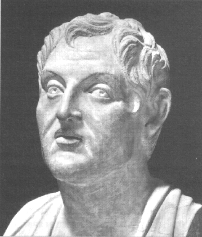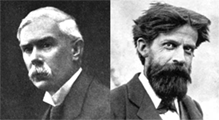Our Master Aristotle

THE WONDER OF THE WORLD
Aristotle, who was not unaccustomed
to resolute thinking, tells us that throughout nature there is always
something of the wonderful - thaumaston. What
precisely is this "wonderful' ? It cannot be merely the startling, as
when we announce the fact that if we could place in one long row all
the hair-like vessels or capillaries of the human body, which connect
the ends of the arteries with the beginnings of the veins, they would
reach across the Atlantic. It would be all the same to us if they
reached only half-way across. Nor can the wonderful be merely the
puzzling, as when we are baffled by the "sailing" of an albatross round
and round our ship without any perceptible strokes of its wings. For
some of these minor riddles are being read every year, without
lessening, however, the fundamental wonderfulness of Nature. Indeed,
the much-abused word wonderful is properly applied to any fact the
knowledge of which greatly increases our appreciation of the
significance of the system of which we form a part. The truly wonderful
makes all other things deeper and higher. Science is always dispelling
mists the minor marvels; but it leaves us with intel lectual blue sky,
sublime mountains, and deep sea. Their wonder appears and remains.
There seems to be a rational basis for wonder in the abundance of power
in the world the power that keeps our spinning earth together as it
revolves round the sun, that keeps our solar system together as it
journeys through space at the rate of twelve miles a second towards a
point in the sky, close to the bright star Vega, called "the apex of
the sun's way". At the other extreme there is the power of a fierce
little world within the complex atom, whose imprisoned energies are set
free to keep up the radiant energies of sun and star. And between these
extremes of the infinitely great and the' infinitely little are the
powers of life the power of winding up the clock almost as fast as it
runs down, the power of a fish that has better engines than those of a
Mauretania, life's power of multiplying itself, so that in a few hours
an invisible microbe may become a fatal million.
Another, also old-fashioned, basis for wonder is to be found in the
immensities. It takes light eight minutes to reach us from the sun,
though it travels at the maximum velocity of about 186,300 miles per
second. So we see the nearest star by the light that left it four years
ago, and Vega as it was twenty-seven years ago, and most of the stars
that we see without a telescope as they were when Galileo Galilei
studied them in the early years of the seven teenth century. In any
case it is plain that we are citizens of no mean city.
A third basis for rational wonder is to be found in the intricacy and
manifoldness of things. We get a suggestion of endless resources in the
creation of individualities. Over two thousand years ago Aristotle knew
about five hundred different kinds of animals; and now the list of the
named and known includes twenty-five thousand different kinds of
backboned animals, and a quarter of a million some insist on a minimum
of half a million backboneless animals, each itself and no other. For
"all flesh is not the same flesh, but there is one kind of flesh of
men, another flesh of beasts, another of fishes, and another of birds".
The blood of a horse is different from that of an ass, and one can
often identify a bird from a single feather or a fish from a few
scales. One is not perhaps greatly thrilled by the fact that the
average man has twenty-five billions of oxygen-capturing red blood
corpuscles, which if spread out would occupy a surface of 3,300 square
yards; but there is signifi cance in the calculation that he has in the
cerebral cortex of his brain, the home of the higher intellectual
activities, some nine thousand millions of nerve cells, that is to say,
more than five times the present population of the globe surely more
than the said brain, as yet makes use of.
So it must be granted that we are fearfully and wonderfully made I Our
body is built up of millions of cells, yet there is a simplicity amid
the multitudinousness, for each cell has the same fundamental
structure. Within the colloid cell-substance there floats a kernel or
nucleus, which contains forty-seven (or in woman forty-eight)
chromosomes, each with a bead-like arrangement of smaller microsomes,
and so on, and so on. Similarly, while eighty- nine different elements
have been discovered out of the theoreti cally possible ninety-two, we
know that they differ from one another only in the number and
distribution of the electrons and protons that make up their
microcosmic planetary system. What artistry to weave the gorgeously
varied tapestry of the world out of two kinds of physical thread
besides, of course, Mind, which eventually searches into the secret of
the loom.
A fourth basis for rational wonder is in the orderliness of Nature, and
that is almost the same thing as saying its intelligibility. What
implications there are in the fact that man has been able to make a
science of Nature ! Given three good observations of a comet, the
astronomer can predict its return to a night. It is not a phan
tasmagoria that we live in, it is a rational! sable cosmos. The more
science advances, the more the fortuitous shrivels, and the more the
power of prophecy grows. Two astronomers foretold the dis covery of
Neptune; the chemists have anticipated the discovery of new elements;
the biologist can not only count but portray his chickens before they
are hatched. The Order of Nature is the largest of all certainties; and
leading authorities in modern physics tell us that we cannot think of
it as emerging from the fortuitous. It is time that the phrase "a
fortuitous concourse of atoms" was buried. Even the aboriginal nebula
was not that I No doubt there have been diseases and tragedies among
men, cataclysms and volcanic eruptions upon the earth, and so on no one
denies the shadows; but even these disturbances are not disorderly; the
larger fact is the absence of all caprice. To refer to the poet's
famous line, no one any longer supposes that gravitation can possibly
cease when he goes by the avalanche. Nor will a microbe's insurgence be
influenced by the social importance of the patient.
Corresponding to the intelligibility of Nature is the pervasiveness of
beauty a fifth of rational wonder, appealing to the emotional side of
our personality; but we have discussed this a little in a previous
section. Surely Lotze was right, that it is of high value to look upon
beauty not as a stranger in the world, nor as a casual aspect of
certain phenomena, but as "the fortunate revela tion of that principle
which permeates all reality with its living activity".
A sixth basis of rational wonder, particularly relevant here and
already illustrated, is to be found in the essential characteristics of
living creatures. We need only add the caution that the marvel of life
is not to be taken at its face value; as Coleridge wisely said, the
first wonder is the child of ignorance ; we must attend diligently to
all that biochemistry and biophysics can discount; we must try to
understand all that can be formulated in terms of colloids, and so on.
Yet when all that is said, there seem to be large residual phenomena
whose emergence in living creatures revealed a new depth in Nature.
Life is an enduring, insurgent activity, growing, multiplying,
developing, enregistering, varying, and above all else evolving.
For this is the seventh wonder Evolution. It is not merely that all
things flow; it is that life flows uphill. Amid the ceaseless flux
there is not only conservation, there is advancement. The changes are
not those of a kaleidoscope, but of "an onward advancing melody". As
the unthinkably long ages passed the earth became the cradle and home
of life ; nobler and finer kinds of living creatures appeared; there
was a growing victory of life over things and of "mind" over "body";
until at last appeared Man, who is Life's crowning wonder, since he has
given to everything else a higher and deeper significance. And while we
must consider man in the light of evolution, as most intellectual
combatants admit, there is the even more difficult task of envisaging
evolution in the light of Man. Finis coronal opus
a wise philosophical axiom; and yet the scientist must qualify it by
asking who can say Finis to Evolution.
in
LIFE:
OUTLINES OF GENERAL BIOLOGY
By
SIR J.ARTHUR THOMSON, M.A.,LL.D.(Edinburgh;St Andrews;Aberdeen)
Professor of Natural History in the University of Aberdeen.
And
PATRICK GEDDES Sometime Lecturer on Zoology, School of Medicine,
Edinburgh; Emeritus Professor of Botany (Univ. Coll., Dundee), St.
Andrews; Late Professor of Sociology and Civics, University of Bombay;
Director of Scots and Indian Colleges at University of Montpellier;
President of the Institutes of Sociology, London, Edinburgh, and
Montpellier.
Volume I., p.38
1931
HARPER
& BROTHERS, PUBLISHERS
NEW YORK AND LONDON

Online in
The Internet
Archive :
Volume 1 :http://www.archive.org/details/lifeoutlinesofge01thomuoft
Volume 2 :http://www.archive.org/details/lifeoutlinesofge02thomuoft